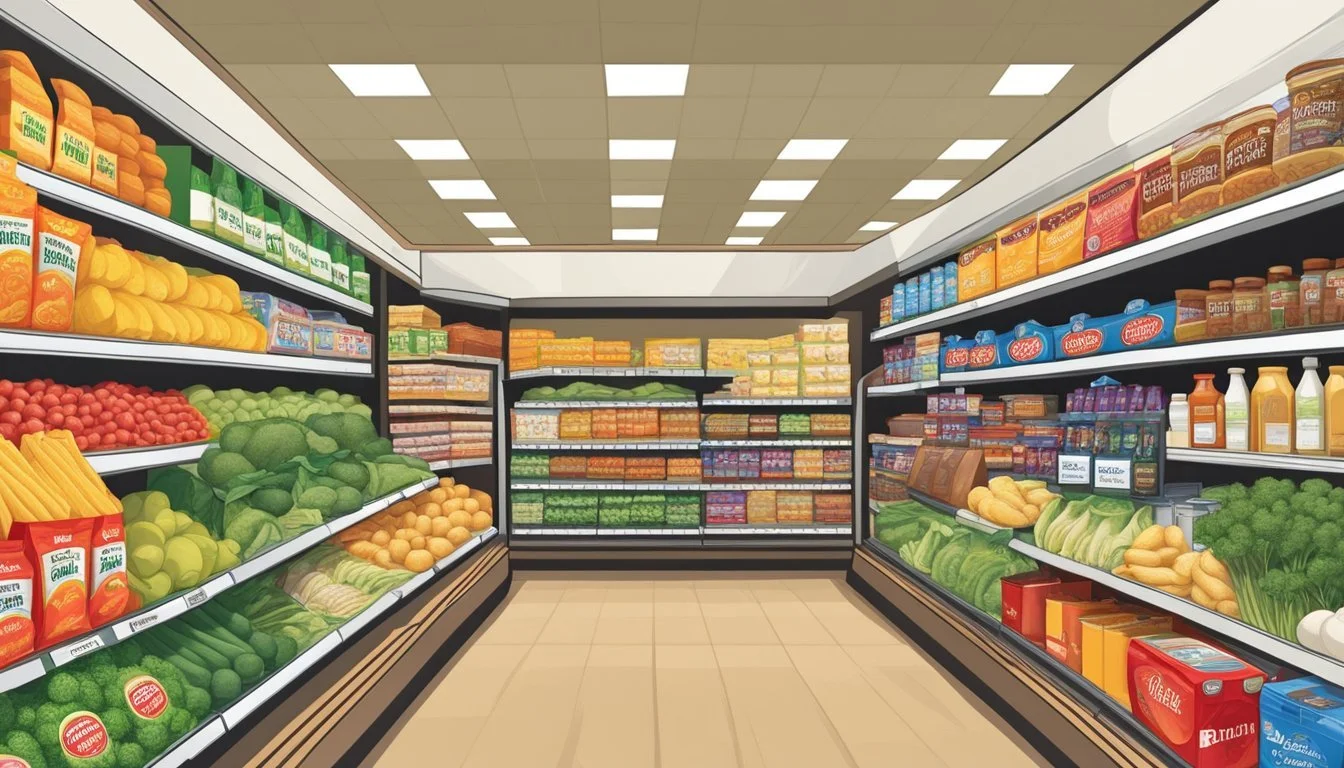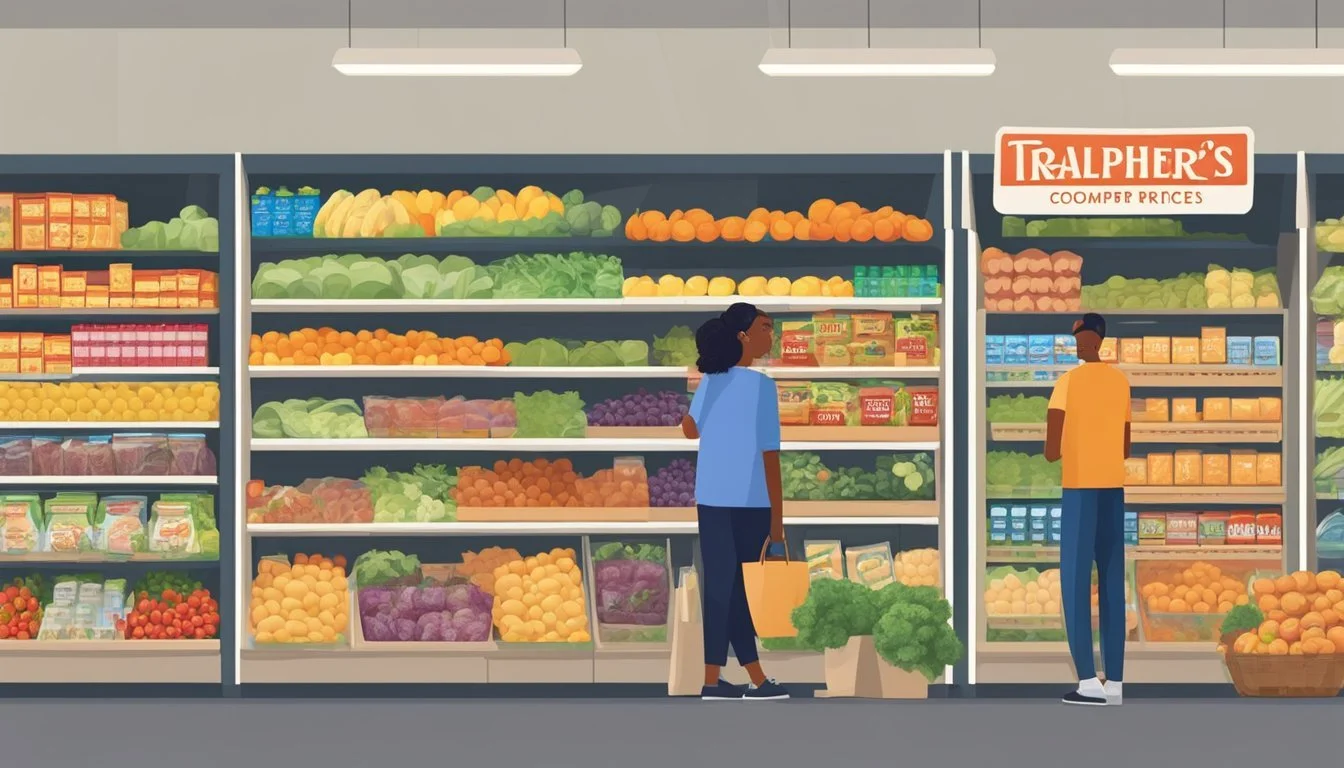Is Trader Joe's Cheaper Than Ralphs?
Comparing Prices Across Popular Grocery Stores
Part of Our Grocery Store Guide with Details on Trader Joe's Prices and Ralphs Prices
When comparing grocery stores, price is often a central factor for consumers. Trader Joe's and Ralphs are two prominent grocery chains that operate in many of the same markets, leading shoppers to question which offers the better value. Trader Joe's, known for its distinctive private label offerings, has a reputation for providing high-quality goods at competitive prices. Investigations into their pricing have shown that Trader Joe's prices can be typically found to be 10% to 20% lower than the average prices at other stores including Ralphs.
Ralphs, as a subsidiary of Kroger, is part of the largest supermarket chain in the U.S. and offers a wide variety of national brands alongside its own store brands. While the pricing at Ralphs is competitive within the market, the perception persists that Trader Joe's private label items often win the price battle, especially for certain categories such as spices, nuts, seeds, oils, and freezer items. However, pricing is not the sole factor, as the quality and variety of goods also play a significant role for consumers when choosing where to shop.
Furthermore, shoppers who prefer organic produce and meats might find differences in cost and selection between the two stores. As the market for organics grows, both Trader Joe's and Ralphs have expanded their offerings, potentially affecting how their prices compare. With the complexity of pricing structures, discounts, and loyalty programs, determining which chain is cheaper requires a nuanced approach, taking into account the types of items purchased, the quality preferences of the consumer, and shopping habits.
Comparing Grocery Store Chains
In assessing the value offered by Trader Joe's in comparison to Ralphs, it is essential to examine each chain with a focus on their pricing, product selection, and overall shopping experience.
Overview of Trader Joe's
Trader Joe's operates as a national chain known for its curated selection of private-label products. They offer a variety of organic and non-organic items, with a reputation for affordable prices, particularly on specialty goods. Often, its products are unique to its stores, which distinguishes its offerings from other chains. The atmosphere of Trader Joe's tends to be more boutique-like, and it appeals to shoppers looking for uncommon and global flavors.
Locations: National presence with a strong following.
Signature items: Specialty and organic foods, alcohols, frozen goods.
Price Range: Generally lower on private-label items.
Consumer Perception: Favorably viewed for unique selections and reasonable prices.
Overview of Ralphs
Ralphs, a subsidiary of Kroger and a fixture in the Californian grocery landscape, offers a traditional supermarket experience with a wide range of brand-name and store-brand products. It features a larger selection including fresh produce, meats, and packaged goods. Regular promotional deals and loyalty programs are available here, which can significantly reduce the cost for shoppers who take advantage of these savings.
Locations: Primarily based in California.
Signature items: Fresh produce, wide-ranging national and in-house brands.
Price Range: Varied, with promotions affecting affordability.
Consumer Perception: Known for convenience and variety, with potential for savings through deals.
Pricing Analysis
In determining whether Trader Joe's is cheaper than Ralph's, the pricing analysis will focus on a comprehensive comparison that encompasses general prices, in-store discounts, and strategically priced items known as loss leaders.
General Price Comparison
Comparative studies concerning the prices at Trader Joe's and Ralph's show consistent trends. Trader Joe's often has lower prices on a variety of items. A CNET analysis highlighted that when comparing basic grocery items, Trader Joe's prices were found to be cheaper in almost every instance compared to a regional chain, implying similar competitive pricing against Ralph's.
Bananas: Trader Joe's - $0.19 each | Ralph's - $0.25 each
Eggs: Trader Joe's - $2.69 per dozen | Ralph's - $2.99 per dozen
Milk: Trader Joe's - $3.29 per gallon | Ralph's - $3.49 per gallon
Discounts and Deals
Shoppers at Ralph's with a club card can access significant savings. These discounts cover various categories and can mean considerable cost savings for regular shoppers. For example, a club card can offer:
Cereal: Regular price - $3.99 | Club card price - $2.99
Chicken Breasts: Regular price - $9.49 per lb | Club card price - $5.99 per lb
Loss Leaders
Loss leaders—products sold at a loss to attract customers—are used strategically by retailers. While both Trader Joe's and Ralph's employ this tactic, the specific items may vary. Ralph's might offer lower prices on select produce or popular items through weekly specials with the aim of drawing customers into the store. For example:
Apples: Regular price - $1.49 per lb | Loss leader price - $0.99 per lb
Bread: Regular price - $2.49 per loaf | Loss leader price - $1.50 per loaf
Trader Joe's does not have sales or offer discounts like a club card, but its everyday prices are often set low enough to be considered equivalent to loss leaders at traditional grocery stores.
Product Offerings
Trader Joe's and Ralphs provide distinct product offerings catering to a variety of consumer tastes and preferences. Their inventory ranges from store brands to specialty diet options.
Store Brand Quality
Trader Joe's boasts a reputation for high-quality store brands encompassing numerous categories such as frozen meals, snacks, and unique condiments like harissa. Consumer perceptions often place Trader Joe's brand items at a higher quality than those offered by Ralphs, praising the taste and quality of Trader Joe's brands.
Produce and Meat Variety
Ralphs typically offers a wider assortment of produce and meats, presenting a broad selection of fresh vegetables, fruits, and meat options. Shoppers looking for a diverse range of fresh produce and meat cuts might find Ralphs to be more accommodating when compared to Trader Joe's, which tends to have a more limited but curated selection.
Dietary Options Availability
Both Trader Joe's and Ralphs cater to various dietary requirements, with shelves stocked with gluten-free, vegan, and other specialty diet options. Trader Joe's is particularly known for its array of unique frozen meals and snacks that meet these dietary needs. However, Ralphs competes with a substantial range of staples providing ample choices for those with specific dietary preferences.
Consumer Shopping Experience
When comparing Trader Joe's and Ralphs, customers often notice distinct differences in store layout and design, as well as in the level of customer service provided. These aspects significantly affect the shopping experience at these regional grocery chains.
Store Layout and Design
Trader Joe's design philosophy centers around creating a warm and inviting atmosphere. Their stores are often smaller and more navigable, with a focus on unique, private-label products displayed in a straightforward manner. This chain tends to curate items, presenting a selection that emphasizes quality and value. They are known for rotating their inventory based on the season or current food trends, which provides a sense of novelty and discovery.
Ralphs, a division of Kroger and a prevalent chain in Southern California, offers a more traditional supermarket layout. Customers can find a wider variety of brand name products, organized into the familiar departments and aisles one would expect from a larger grocery store. Shoppers seeking a comprehensive one-stop shopping experience may prefer the larger scale and familiar organization Ralphs provides.
Customer Service
Trader Joe's is renowned for their friendly staff and personable service. Employees, known as "Crew Members," are typically easy to spot in their Hawaiian-themed shirts and are encouraged to engage with customers, making the shopping experience more intimate and pleasant. They often go above and beyond in assisting shoppers, which includes offering product recommendations or cooking tips.
On the other hand, Ralphs provides a customer service experience that aligns with traditional grocery stores. They offer self-checkout options and have staff available to assist, albeit often in a more transactional manner. Shoppers can expect assistance when needed, though interactions might not have the same personal touch that Trader Joe's strives to provide.
Financial Considerations for Shoppers
When deciding between Trader Joe's and Ralphs, shoppers consider the immediate impact on their grocery bills and the broader economic factors that influence prices.
Budget Impact on Grocery Bills
Trader Joe's has been identified as generally more affordable than Ralphs, especially for shoppers focused on their 2022 grocery bill. A study by Consumer’s Checkbook found that Trader Joe's prices were 10% to 20% lower than average prices at other stores. This aligns with Thrillist's observation that even when prices are the same, Trader Joe’s often offers superior brand quality.
Trader Joe's: Known for budget-friendly frozen meals, snacks, and specialty items.
Ralphs: Offers competitive prices on produce, drinks, and spices.
Shoppers can expect a noticeable difference in their grocery spending by choosing Trader Joe's for store brand items, which can result in significant annual savings.
Economic Factors Influencing Prices
The prices at grocery stores like Trader Joe's and Ralphs are impacted by various economic factors. These can include supply chain dynamics, operational costs, and consumer trends. In 2022, economic pressures such as inflation can affect pricing across the board, though some stores may absorb these costs better than others due to their business models.
Supply Chains: Stores with robust supply chains may offer lower prices.
Operational Costs: Different operational costs can lead to price variations.
Shoppers should consider these economic factors as they can cause fluctuations in pricing, influencing the affordability of grocery items over time.
Brand Perception and Market Position
The competitive landscape of grocery retailers showcases the distinct positioning of Trader Joe's and Ralphs. Trader Joe's operates with a quirky, value-oriented image, while Ralphs maintains a strong presence due to its comprehensive range and conventional supermarket model.
Trader Joe's Brand Image
Trader Joe's distinguishes itself through its unique brand image. Known for its private label products, Trader Joe's curates an experience that feels both gourmet and affordable. They focus on offering a variety of products, many of which are exclusive to their stores, thus creating a sense of novelty and discovery. The company also prioritizes customer engagement, leveraging market intelligence to understand and respond to shopper preferences.
Ralphs Market Presence
Ralphs, on the other hand, emphasizes its market presence as a traditional, full-service supermarket. With a wide range of products from various vendors, Ralphs caters to a diverse customer base seeking both brand name and private label options. Their focus is on providing a complete shopping experience, from fresh produce to household essentials, which aligns with the expectations from a conventional grocery store. Ralphs is part of the larger Kroger family, benefiting from the purchasing power and supply chain efficiency this association provides.
Additional Shopping Factors
When comparing the affordability of Trader Joe's and Ralphs, customers should also consider the ease of access to store locations and the convenience of online shopping features.
Location and Accessibility
In Los Angeles, both Trader Joe's and Ralphs have multiple locations. Trader Joe's is often found in densely populated urban areas and may provide easier access for city dwellers looking for quick shopping trips. On the other hand, Ralphs typically offers larger store formats and may have a broader reach, including suburban areas, which could make it a more accessible option for those living outside of the city core.
Online Shopping and Delivery Options
Trader Joe's has traditionally focused on the in-store experience and does not offer an online shopping platform. However, Ralphs provides comprehensive online shopping and delivery options, including partnerships with third-party delivery services like Instacart. This means for those who prioritize the convenience of shopping from home and having groceries delivered to their door, Ralphs may hold a significant advantage over Trader Joe's.
Expert and Consumer Insights
In gauging the affordability between Trader Joe's and Ralphs, expert analyses and consumer opinions provide valuable information. They shed light on price comparisons, shopping experience, and product preferences.
Reviews and Ratings
Experts have conducted thorough comparisons, with one study concluding that Trader Joe's prices were typically 10% to 20% lower than the average prices at other stores it surveyed. Consumer reviews have echoed these findings, often pointing out that certain categories like spices, nuts, seeds, oils, and freezer items offer significant savings at Trader Joe's. Ratings from various sources consistently highlight the store's competitiveness in pricing these specific categories.
AllRecipes: Noted savings on spices and freezer items at Trader Joe's.
CNET: Found Trader Joe's to be the winner in a price comparison of basic staples.
Commentaries and Discussions
Online discussions, like those found in Reddit posts, go beyond price comparisons to factor in shopping experience and variety. For instance, consumers often discuss the unique and eclectic selection Trader Joe's offers, especially for frozen meals, snacks, and exclusive products. In contrast, Ralphs is frequently mentioned for its range of produce, drinks, and spices.
Reddit Comment: Trader Joe's is favored for unique items and frozen meals.
Consumer Discussions: Highlight Ralphs for its produce and staple goods.
These discussions reflect the complexity of consumer preference, suggesting that shoppers may choose a store not solely based on price but also the variety and experience offered.
Conclusion
When comparing prices and quality between Trader Joe's and Ralphs, consumers are tasked with considering both the affordability and the value offered by each grocery chain. Trader Joe's maintains a reputation for competitive pricing—typically 10% to 20% lower than some other grocers. This generally positions Trader Joe's as a more economical choice for products such as spices, nuts, seeds, oils, and frozen items.
Ralphs, on the other hand, offers a broader selection, which can influence the shopping experience. Customers often favor Ralphs for produce, beverages, and spices, reflecting a preference for variety and the convenience of a one-stop shop.
Savings can be a crucial factor, and for budget-conscious shoppers, the price differential at Trader Joe's can translate into notable annual savings. However, the assessment of quality is subjective, and some customers perceive an advantage in Trader Joe's brand products over Ralphs' offerings.
To summarize, shoppers looking to optimize their grocery budget without compromising on quality may find Trader Joe's to be the superior option. Conversely, those who prioritize selection and variety might lean towards Ralphs. Ultimately, customer preferences and shopping patterns will strongly influence their choice between these two retailers.








